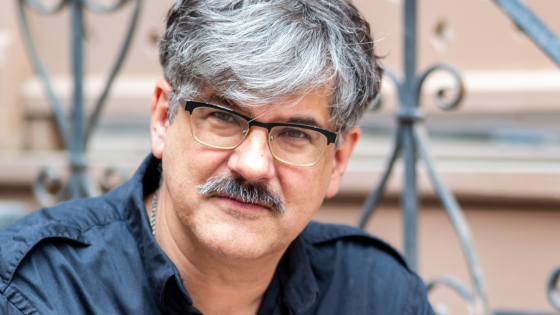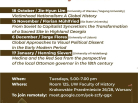From Soviet to Capitalist Sovereignty. The Transformation of a Sacred Site in Highland Georgia
Zapraszamy na kolejne z cyklu Seminarium Global History & Anthropology. Naszym gościem tym razem będzie Florian Mühlfried, prof. antropologii z Ilia State University (Tbilisi, Gruzja).

As the neighbouring regions Pshavi and Khevsureti, the Georgian highland province Tusheti is dotted with sacred sites indistinctly referred to as pagan, animist or syncretistic by specialists. All of these places are taboo to women and generally restricted in access. This is why, according to a popular narrative in Tusheti’s regional capital Omalo, a dormitory meant to be built by the Soviet authorities in the 1980s was never finished – it was perceived as too close to the local sacred site. Later on, according to the same narrative, the building was used by the military that left, however, after some uncanny experiences attributed to emanations of the sacred site. Afterwards, it remained a ruin until in 2019, the businessmen Lash Papashvili invested a large sum to turn the building into a luxury hotel. Concomitantly, he financed a roof of the sacred site, ornamented with Georgian saints and thus framing the site as Christian Orthodox. At the same time, the roof also expresses the material investment into the hotel and thus financial sovereignty over (sacred) space. Taking of from what it means to have a roof (krisha) in post soviet societies, I will show in my analysis how the practice of care as part of the legitimacy of state sovereignty has changed from protection to subjection.
Bio:
Florian Mühlfried is full professor for social anthropology at the Ilia State University. Before, he was a lecturer at the Tbilisi State University, research fellow at the Max Planck Institute for Social Anthropology, visiting professor at UNICAMP, Brazil and assistant professor at the Friedrich Schiller University Jena. His publications include the monographs Mistrust: A Global Perspective (2019), Being a State and States of Being in Highland Georgia (2014) and Post-Soviet Feasting: The Georgian Banquet in Transition (2006, in German) as well as the edited volumes Mistrust: Ethnographic Approximations (2018), Sacred Places, Emerging Spaces: Religious Pluralism in the Post-Soviet Caucasus (2018, coedited with Tsyplylma Darieva and Kevin Tuite) and Soviet Era Anthropology in the Caucasus and Central Asia (2012, coedited with Sergey Sokolovskiy).
Następne spotkania zaplanowane w ramach Seminarium:
- 6 grudnia 2022: Jorge Flores (University of Lisbon), ‘Global Approaches to Visual Political Dissent in the Early Modern Period’
- 17 stycznia 2023: Henning Sievert (University of Heidelberg), ‘Medina and the Red Sea from the Perspective of the Local Ottoman Governor in the 18th Century’
Organizatorem Seminarium jest Zespół Historii Globalnej (Wydział Historii) oraz Instytut Etnologii i Antropologii Kulturowej WNKS UW.



